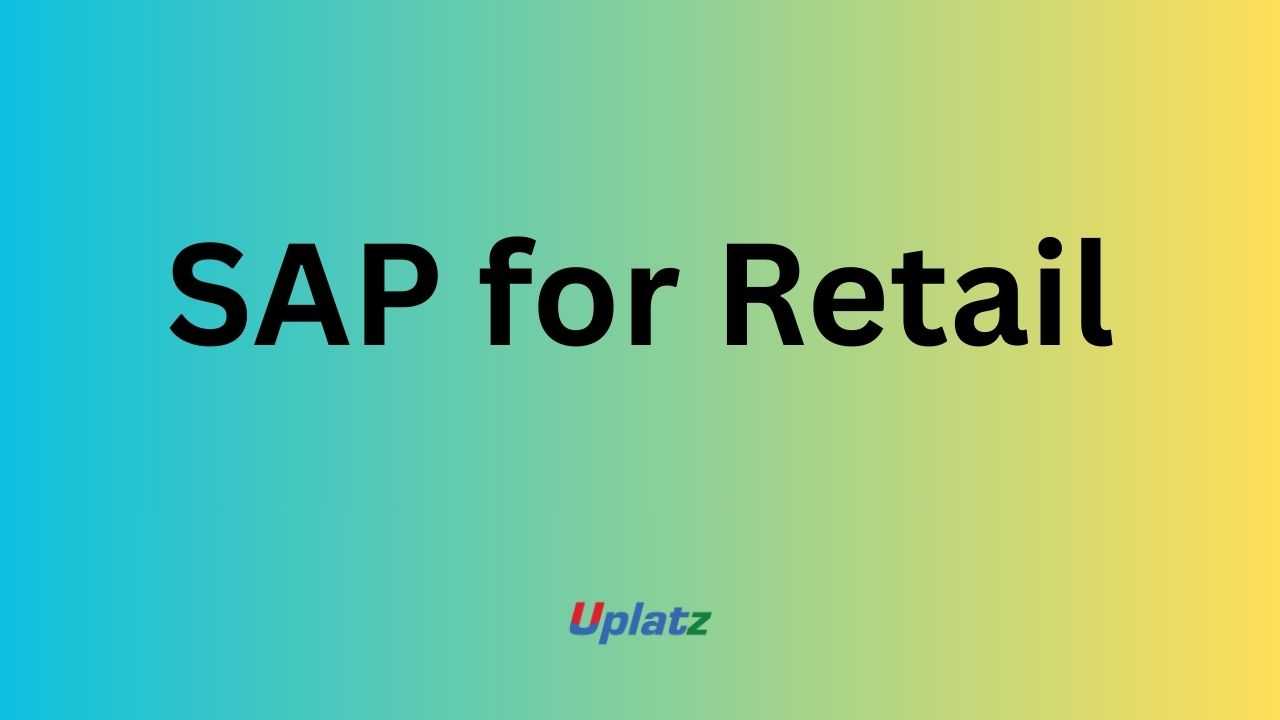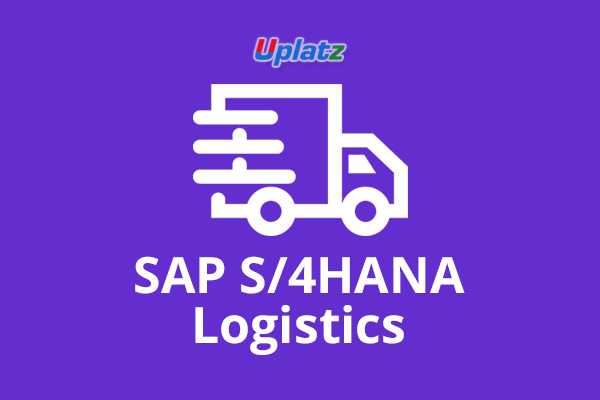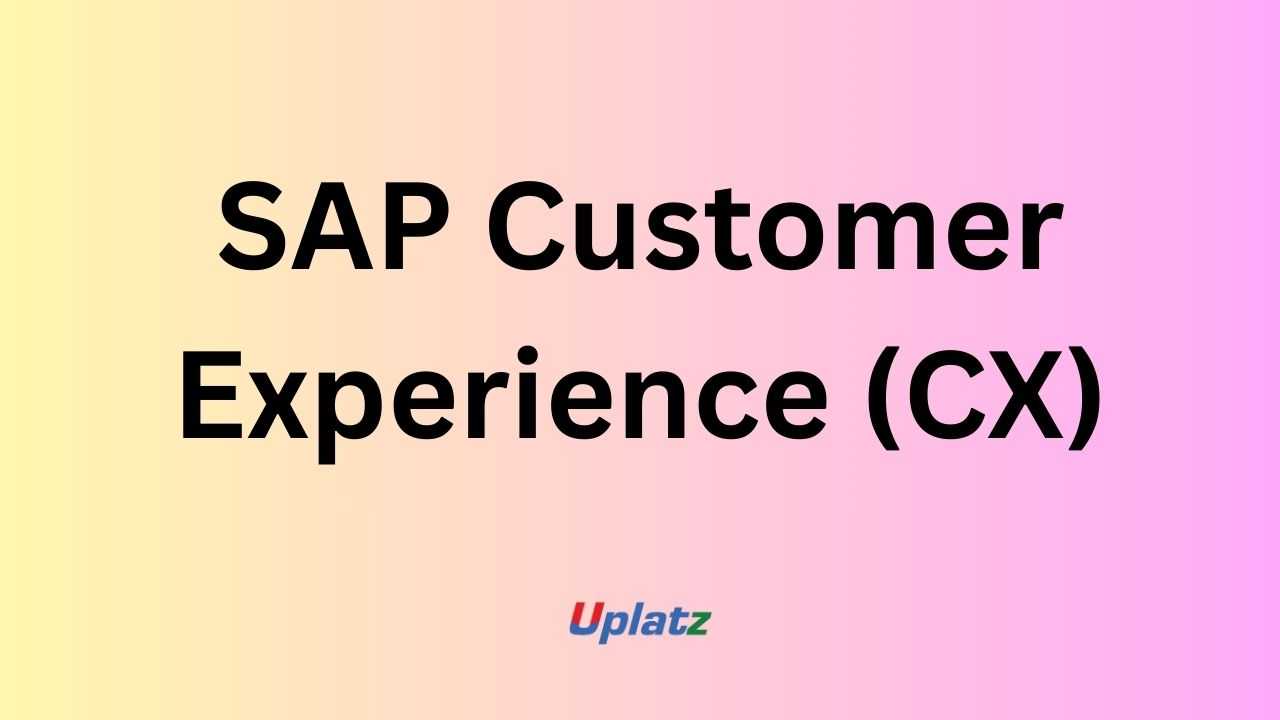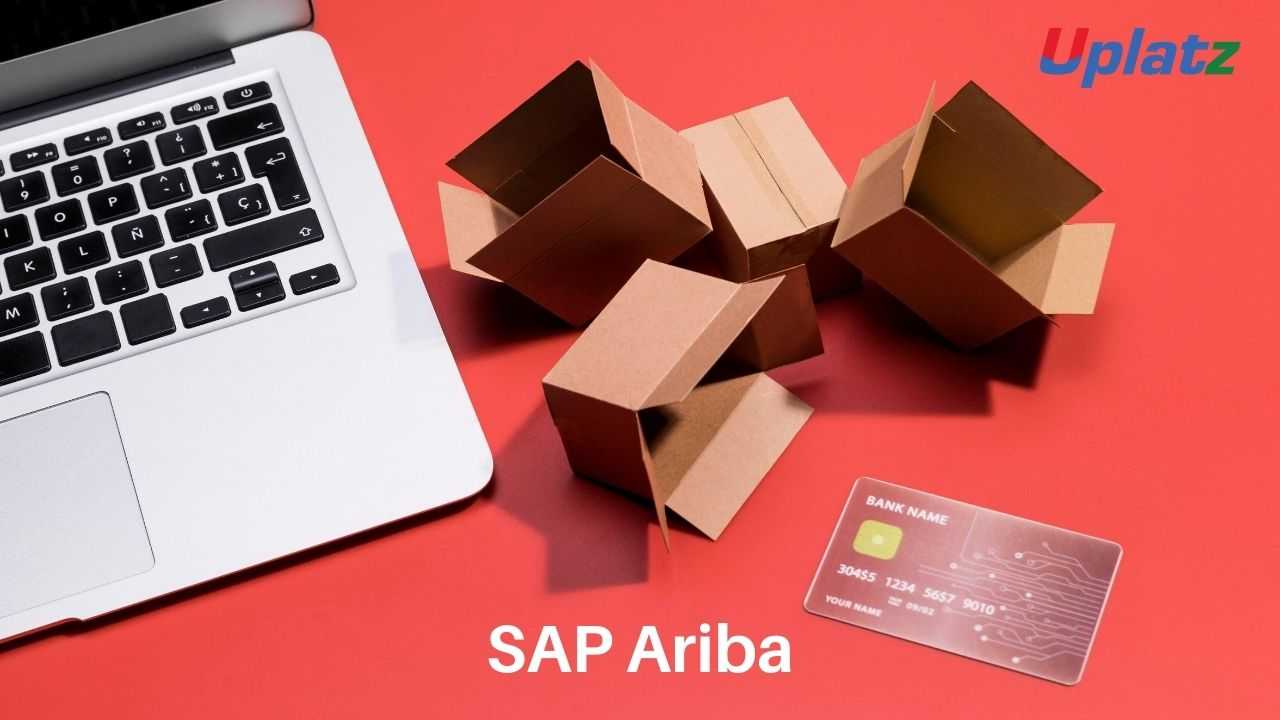SAP for Retail
Master SAP for Retail to optimize merchandising, supply chain, and customer experience in the retail industry. Price Match Guarantee
Full Lifetime Access
Access on any Device
Technical Support
Secure Checkout
Course Completion Certificate
Price Match Guarantee
Full Lifetime Access
Access on any Device
Technical Support
Secure Checkout
Course Completion Certificate
 97% Started a new career
BUY THIS COURSE (GBP 29)
97% Started a new career
BUY THIS COURSE (GBP 29)
-
 85% Got a pay increase and promotion
85% Got a pay increase and promotion
Students also bought -
-

- SAP S/4HANA Logistics
- 32 Hours
- GBP 29
- 1643 Learners
-

- SAP Customer Experience (CX)
- 10 Hours
- GBP 12
- 10 Learners
-

- SAP Ariba (basic to advanced)
- 30 Hours
- GBP 12
- 93 Learners

SAP for Retail is a comprehensive, industry-specific solution designed to help retailers manage their entire business lifecycle efficiently — from merchandising and inventory management to supply chain optimization, store operations, and omnichannel customer engagement.
As part of the SAP Industry Solutions portfolio, it integrates seamlessly with SAP S/4HANA, SAP Customer Experience (CX), and SAP Analytics Cloud (SAC), enabling real-time visibility, operational excellence, and intelligent, data-driven decisions across every retail process.
This SAP for Retail – Self-Paced Online Course by Uplatz offers a complete, career-oriented learning journey for professionals aiming to master SAP’s retail ecosystem. Whether you are an SAP consultant, business analyst, or retail manager, this training provides both the functional understanding and technical know-how required to implement, configure, and optimize SAP Retail solutions for modern digital enterprises.
Through real-world case studies and interactive simulations, you’ll learn how global retailers use SAP to manage assortments, pricing, promotions, and customer journeys — creating agile, personalized, and future-ready retail experiences.
🔍 What is SAP for Retail?
SAP for Retail is an enterprise-grade digital platform tailored to address the dynamic challenges of the retail sector. It unifies every retail function — from procurement and product lifecycle management to distribution, marketing, and customer loyalty — within a single, intelligent system.
Built on the SAP S/4HANA digital core, it leverages in-memory computing to process massive data volumes in real time, powering AI-driven recommendations, predictive analytics, and process automation.
SAP for Retail also integrates tightly with:
-
SAP CX for omnichannel marketing and personalized engagement,
-
SAP Commerce Cloud for e-commerce management, and
-
SAP Analytics Cloud (SAC) for strategic reporting and performance dashboards.
This holistic approach enables organizations to break down silos, streamline workflows, and deliver consistent brand experiences across stores, digital channels, and supply networks — driving both profitability and customer loyalty.
⚙️ How SAP for Retail Works
SAP for Retail consolidates data from stores, warehouses, suppliers, and online channels into a single, unified ecosystem. It empowers retail teams to plan, execute, and analyze every aspect of their operations.
Here’s how it works across major domains:
🛒 Merchandising
Manage assortments, pricing, promotions, and markdowns through integrated planning tools that ensure consistent product strategies.
🚚 Supply Chain & Logistics
Forecast demand, optimize replenishment cycles, and collaborate with vendors to minimize shortages and overstocks.
🏬 Store Operations
Control point-of-sale (POS) transactions, workforce scheduling, and real-time inventory movements across outlets.
🌐 Omnichannel Integration
Unify physical and digital stores for seamless customer experiences — from online browsing to in-store pickup and delivery.
📊 Analytics & AI
Use predictive models and dashboards to monitor sales trends, consumer behavior, and operational KPIs for proactive decision-making.
By replacing fragmented legacy systems with a connected digital core, SAP for Retail enables retailers to react swiftly to market trends, seasonal changes, and shifting consumer preferences.
🏭 How SAP for Retail is Used in the Industry
Leading retailers such as Walmart, H&M, Carrefour, and Metro rely on SAP for Retail to streamline their operations and enhance customer satisfaction.
It is widely adopted across multiple retail sectors:
-
Fashion & Apparel: Manage collections, style hierarchies, and seasonal assortments.
-
Grocery & Food Retail: Balance perishable inventory, demand forecasting, and replenishment.
-
Electronics & Lifestyle: Coordinate omnichannel pricing, product launches, and after-sales service.
-
E-Commerce & Omnichannel Retail: Integrate web storefronts with brick-and-mortar stores for a unified shopping journey.
By adopting SAP’s integrated retail modules, organizations achieve operational agility, reduce returns and stock-outs, and deliver personalized shopping experiences that increase both revenue and customer loyalty.
🌟 Benefits of Learning SAP for Retail
Mastering SAP for Retail adds immense value to your professional toolkit, whether you work in retail strategy, merchandising, or IT implementation.
Key benefits include:
-
Comprehensive Visibility: End-to-end control over merchandising, logistics, and store management.
-
Data-Driven Decisions: Access real-time insights for smarter pricing, promotions, and assortment strategies.
-
Customer Experience Enhancement: Integrate with SAP CX for personalized campaigns and engagement.
-
Omnichannel Agility: Connect e-commerce, POS, and back-office operations seamlessly.
-
Career Advancement: Gain a niche, high-demand SAP specialization sought by global retailers.
-
Future-Ready Expertise: Understand how AI, IoT, and analytics redefine modern retail.
-
Global Recognition: SAP Retail certification is valued by enterprises and consulting firms worldwide.
By the end of this course, you will not just know how the system works — you will understand how to leverage it for measurable business results.
📘 What You’ll Learn in This Course
This course combines theory, configuration, and practical simulation to ensure complete understanding. You’ll cover:
-
SAP for Retail system architecture and landscape
-
Core modules: Merchandising, Store Ops, Inventory, Supply Chain
-
Assortment and lifecycle planning
-
Pricing and markdown optimization
-
POS integration and real-time analytics
-
Omnichannel commerce with SAP CX
-
Integration with SAP S/4HANA for centralized operations
-
Retail analytics with SAP Analytics Cloud (SAC) and predictive insights
-
Configuration of retail master data, articles, and transactions
-
Real-world case studies from live SAP Retail implementations
Every module includes interactive video lessons, system walkthroughs, and scenario-based exercises, allowing you to translate classroom learning into enterprise-ready skills.
🧠 How to Use This Course Effectively
To maximize learning outcomes:
-
Start with Fundamentals: Review architecture, core modules, and process flows.
-
Apply Concepts Practically: Replicate business scenarios in the provided system simulations.
-
Explore Integrations: Link SAP Retail with CX and Analytics Cloud for hands-on understanding.
-
Revisit Advanced Topics: Strengthen your knowledge of AI, automation, and analytics.
-
Complete Assignments: Use quizzes and projects to reinforce retention.
-
Engage with Case Studies: Learn from real enterprise examples to connect theory with practice.
-
Implement on Projects: Translate your learning into tangible business improvements or consulting deliverables.
👩💻 Who Should Take This Course
This program is ideal for:
-
SAP Functional Consultants in retail, logistics, or MM/SD domains.
-
Business Analysts driving process transformation.
-
Merchandising & Supply Chain Managers optimizing operations.
-
Customer Experience Teams enhancing omnichannel engagement.
-
Students & IT Professionals pursuing a career in SAP Industry Solutions.
-
Retail Organizations upskilling teams for digital transformation.
No prior SAP configuration experience is required — only a basic understanding of retail business workflows.
🧩 Course Format and Certification
The course is self-paced with lifetime access to all resources and updates.
You’ll receive:
-
HD video tutorials with live SAP system demonstrations
-
Downloadable configuration and process guides
-
Practical assignments and case simulations
-
Real-world implementation insights
-
Access to the Uplatz community for mentorship and Q&A
Upon completion, you’ll earn a Course Completion Certificate from Uplatz — verifying your proficiency in SAP for Retail and your readiness to support or lead SAP Retail projects globally.
🚀 Why This Course Stands Out
-
Comprehensive Coverage: From merchandising to analytics and AI.
-
Practical Orientation: Real case studies, not just theory.
-
Up-to-Date Content: Aligned with SAP S/4HANA Retail and CX integration.
-
Career-Enhancing Focus: Builds high-value domain expertise.
-
Lifetime Learning: Includes future SAP feature updates.
By course end, you’ll be ready to deploy SAP Retail solutions, improve store performance, and drive digital transformation across retail enterprises.
🌐 Final Takeaway
The global retail industry is rapidly embracing digital transformation — and SAP for Retail stands at its core. By integrating every aspect of retail operations under one intelligent platform, SAP enables companies to become agile, customer-centric, and data-driven.
The SAP for Retail – Self-Paced Online Course by Uplatz equips you with the strategic and technical skills to implement and manage these solutions effectively. Whether your goal is career advancement, project leadership, or organizational transformation, this program empowers you to become part of the next generation of SAP Retail professionals shaping the future of digital commerce.
Start learning today — and transform how retail works.
By completing this course, learners will:
-
Navigate SAP for Retail modules and processes.
-
Configure merchandise and assortment management.
-
Manage pricing, promotions, and markdowns.
-
Integrate store operations with POS systems.
-
Use supply chain management for retail efficiency.
-
Deliver omnichannel experiences with SAP CX integration.
Course Syllabus
Module 1: Introduction to SAP for Retail
-
Overview of SAP Retail solution
-
SAP S/4HANA Retail for merchandise management
-
Retail industry challenges and SAP’s role
Module 2: Merchandise & Assortment Management
-
Master data setup (articles, assortments, sites)
-
Pricing and promotions
-
Markdown planning
Module 3: Supply Chain & Inventory Management
-
Replenishment and allocation
-
Warehouse integration
-
Supplier collaboration and procurement
Module 4: Store Operations
-
Store inventory management
-
POS data management and integration
-
Workforce and task management
Module 5: Omnichannel & Customer Experience
-
SAP Customer Activity Repository (CAR)
-
Omnichannel order management
-
Integration with SAP CX suite (Marketing, Commerce, Sales)
Module 6: Analytics & AI in Retail
-
Demand forecasting and planning
-
Retail KPIs and dashboards with SAP Analytics Cloud
-
AI/ML use cases in retail (personalization, inventory prediction)
Module 7: Integration & Extensions
-
SAP S/4HANA integration
-
SAP BTP extensions for retail
-
Third-party system integration
Module 8: Real-World Projects
-
Assortment and merchandise planning project
-
Store operations optimization case study
-
Omnichannel commerce implementation
-
Retail analytics dashboard
Module 9: Best Practices & Future Trends
-
Digital transformation in retail
-
Sustainable retail practices with SAP
-
Future of AI-driven retail experiences
Learners will receive a Certificate of Completion from Uplatz, validating their expertise in SAP for Retail. This certification demonstrates readiness for roles in SAP consulting, retail operations, and digital transformation.
SAP for Retail skills prepare learners for roles such as:
-
SAP Retail Consultant
-
Merchandising & Assortment Analyst
-
Supply Chain Manager (Retail)
-
Omnichannel Commerce Specialist
-
Retail Transformation Manager
SAP for Retail is widely adopted by global retailers in fashion, supermarkets, e-commerce, and consumer goods—making it a highly valuable skill in enterprise IT.
1. What is SAP for Retail?
An industry-specific SAP solution for managing merchandising, supply chain, store operations, and customer experience in retail.
2. What industries use SAP Retail?
Fashion, supermarkets, department stores, e-commerce, and consumer goods retailers.
3. What is merchandise management in SAP Retail?
The process of managing articles, assortments, pricing, promotions, and markdowns.
4. How does SAP Retail support supply chain operations?
Through replenishment, allocation, supplier collaboration, and warehouse integration.
5. What is SAP CAR (Customer Activity Repository)?
A platform for consolidating customer and sales data to enable real-time retail analytics and omnichannel experiences.
6. How does SAP Retail integrate with store POS systems?
By managing POS inbound/outbound data, sales transactions, and stock adjustments.
7. What are the benefits of SAP for Retail?
-
End-to-end retail process coverage
-
Omnichannel commerce enablement
-
Real-time inventory visibility
-
Integration with SAP S/4HANA and CX
8. What are challenges with SAP Retail?
-
Complex master data management
-
High implementation cost
-
Integration with legacy systems
9. How does SAP Retail support omnichannel commerce?
By integrating with SAP CX (Commerce, Marketing, Sales) and enabling unified order management.
10. Where is SAP Retail being adopted?
By global retailers modernizing their merchandising, supply chain, and omnichannel strategies.









